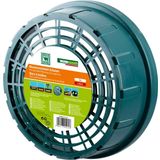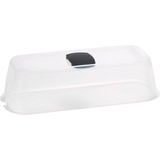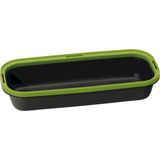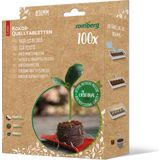Trouble with Wasps? Here Are Some Tips & Tricks!
2015 has been an incredible year for wasps, much to the chagrin of those who spend a lot of time on the terrace, in the garden or in front of the grill. Here are a few tips on saving yourself some trouble
What kind of weather makes for a great wasp year? The best wasp weather is a mild winter and a long, hot summer. Precisely these conditions that have prevailed this year. Due to the very warm winter many queen wasps have survived. The persistent heat does the rest, because the insects are not bothered by the heat or predators. Perfect conditions for more wasps.
The highlights of the wasp calendar are August and September. A nest in such a good year can easily house 10,000 insects. In Central Europe, the German wasp or German yellowjacket is the most common type of wasp.
When wasps go on the hunt for food, they are on the hunt for sugar or protein. These are exactly the kinds of foods found at a BBQ.
Wasps are actually useful animals. They help in the pollination of plants, eat other insects, including many pests, and serve as food for birds.
Nevertheless, wasps can be very annoying. To avoid bites and keep them from enjoying your BBQ more than you do, there are a few tricks and tips.
Dos and Don'ts when dealing with wasps
-
If wasps come close to you, do not flail around. Wasps sting when they feel threatened and wildly scrabbling around and screaming gives them a reason. Stay calm. Once the wasp notices that you don't have anything they want, they will go away.
-
Also, blowing on the insects is not a good idea. The CO2 from your breath makes the animals aggressive. CO2 is naturally used as an alarm signal at the insects nest.
-
Avoid bright colors or floral patterns when choosing your clothing. The least interesting color for wasps is white.
-
Strong odors should also be avoided. Avoiding perfumes, deodorants and the like makes you less attractive to the insects.
-
Beware when drinking. Wasps like to climb into jars and bottles. Wasps in bottles are often overlooked and can lead to stings in the mouth or throat, which can be very dangerous. To play it safe, use a straw. You can also save yourself a lot of trouble by covering your drink with a coaster.
-
Cover your food. If the wasps can't get to your food, they will leave. This is the simplest way to avoid a plague of wasps.
-
Of course, covering your food is not always practical, especially when the whole point of making a great meal is to enjoy it. Here, there are a few simple tricks that can help: One way is to burn coffee powder. Fill for an ovenproof dish with coffee powder and ignite it. It will not burn, but will glow and smoke. The resulting odor and smoke drive away the wasps. Another tip is to divert the wasps. Leave a bowl of overripe fruit at a distance of 5-10 meters away. Wasps like grapes the best. The wasps won't be able to avoid this temptation. Honey and marmalade are less suitable because they make the insects more aggressive.
-
Hornets are the only species of wasp that fly at night. If you do not want the animals to visit, turn off all unnecessary lights. Hornets are actually most attracted to lights.
-
If you are stung, it is best to cool the affected area. If there is a rash, severe swelling or shortness of breath, it is essential to call the ambulance.
By early October, the nights become colder and the wasp population decreases. Then the year of the wasp will come to an end.
Latest reviews
-
 3.7 (3)
3.7 (3)Windhager Flower Bulb Tray Ø 22 cm, 3 items
-10%- Protects against voles
- Ideal for winter
- Easy to clean
£4.63 £5.15 (£1.54 / item)Delivery by February 26
-
 5.0 (1)
5.0 (1)Romberg Growing Tray Lid S BOQUBE Anthracite
-10%- 28 x 12 x 8 cm
- Made in Germany
- With a ventilation regulator
£3.78 £4.20Delivery by February 26
-
 5.0 (1)
5.0 (1)Romberg BOQUBE Cultivation Bowl S Anthracite & Summer Green
-11%- 28 x 12 x 5cm
- Space saving
- Stable
£3.35 £3.75Delivery by February 26
-
 4.0 (1)
4.0 (1)Romberg Coconut Coir Tablets - Ø 36 mm, 100 (100 items)
-10%- 100% peat-free
- With pre-drilled holes
- No transplant shock
£12.67 £14.10 (£0.13 / item)Delivery by February 26
Magazine Articles:
Discover Bloomling:
-
Great Britain: Free standard delivery from £69.90
-
Free
returns More than 6.500 products
Secure payments
with SSL encryption technology
